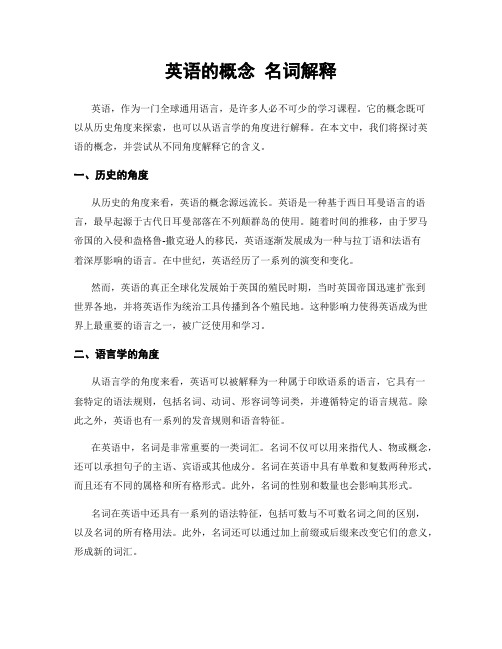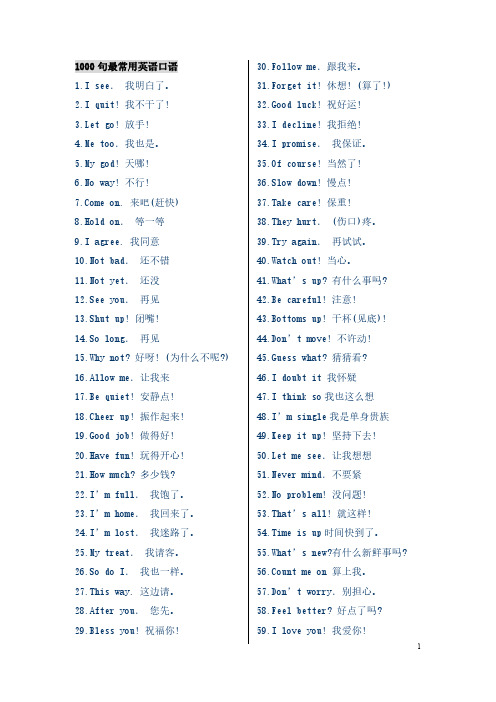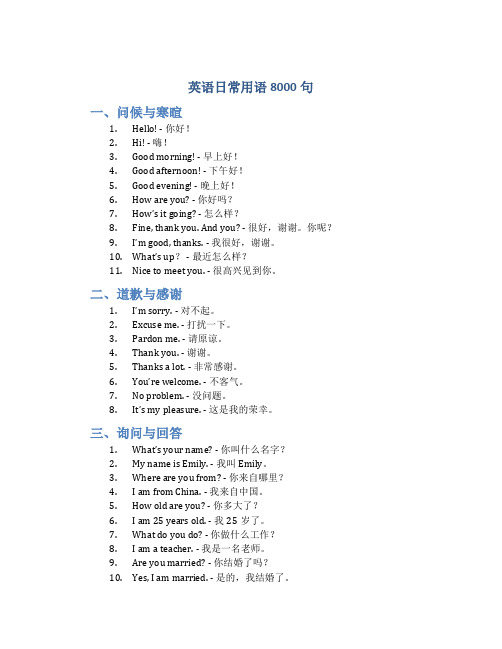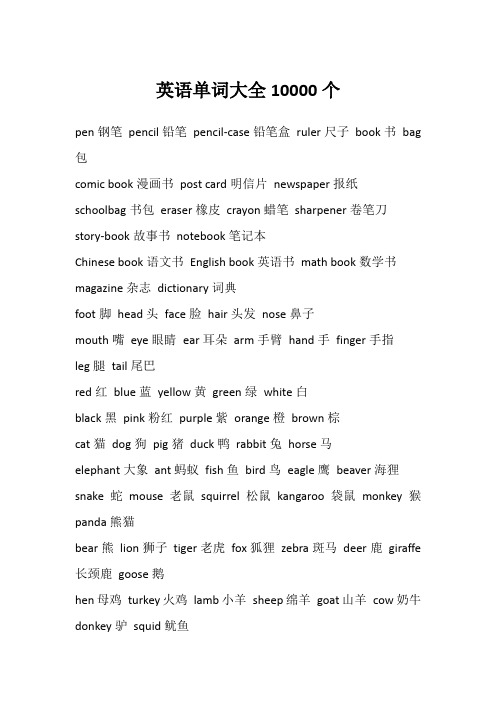英语
英语的概念 名词解释

英语的概念名词解释英语,作为一门全球通用语言,是许多人必不可少的学习课程。
它的概念既可以从历史角度来探索,也可以从语言学的角度进行解释。
在本文中,我们将探讨英语的概念,并尝试从不同角度解释它的含义。
一、历史的角度从历史的角度来看,英语的概念源远流长。
英语是一种基于西日耳曼语言的语言,最早起源于古代日耳曼部落在不列颠群岛的使用。
随着时间的推移,由于罗马帝国的入侵和盎格鲁-撒克逊人的移民,英语逐渐发展成为一种与拉丁语和法语有着深厚影响的语言。
在中世纪,英语经历了一系列的演变和变化。
然而,英语的真正全球化发展始于英国的殖民时期,当时英国帝国迅速扩张到世界各地,并将英语作为统治工具传播到各个殖民地。
这种影响力使得英语成为世界上最重要的语言之一,被广泛使用和学习。
二、语言学的角度从语言学的角度来看,英语可以被解释为一种属于印欧语系的语言,它具有一套特定的语法规则,包括名词、动词、形容词等词类,并遵循特定的语言规范。
除此之外,英语也有一系列的发音规则和语音特征。
在英语中,名词是非常重要的一类词汇。
名词不仅可以用来指代人、物或概念,还可以承担句子的主语、宾语或其他成分。
名词在英语中具有单数和复数两种形式,而且还有不同的属格和所有格形式。
此外,名词的性别和数量也会影响其形式。
名词在英语中还具有一系列的语法特征,包括可数与不可数名词之间的区别,以及名词的所有格用法。
此外,名词还可以通过加上前缀或后缀来改变它们的意义,形成新的词汇。
值得一提的是,英语名词的使用也受到语境和习惯用法的影响。
在不同的语境中,名词可以有不同的含义和用法,这使得学习英语的人需要注重词义的理解和语境的把握。
三、英语的应用英语作为一种语言,在世界上广泛应用。
它是联合国的工作语言之一,也是许多国际组织和学术机构使用的语言。
无论是商务交流、学术研究还是跨文化交流,英语都扮演着重要的角色。
在现代科技与全球化的背景下,英语的重要性更加凸显。
通过掌握英语,人们可以更方便地获取国际新闻、文化资讯以及学习最新科技知识。
英语口语最常用1000句

1000句最常用英语口语1.I see.我明白了。
2.I quit! 我不干了!3.Let go! 放手!4.Me too.我也是。
5.My god! 天哪!6.No way! 不行!e on. 来吧(赶快)8.Hold on.等一等9.I agree. 我同意10.Not bad.还不错11.Not yet.还没12.See you.再见13.Shut up! 闭嘴!14.So long.再见15.Why not? 好呀! (为什么不呢?)16.Allow me.让我来17.Be quiet! 安静点!18.Cheer up! 振作起来!19.Good job! 做得好!20.Have fun! 玩得开心!21.How much? 多少钱?22.I’m full.我饱了。
23.I’m home.我回来了。
24.I’m lost.我迷路了。
25.My treat.我请客。
26.So do I.我也一样。
27.This way. 这边请。
28.After you.您先。
29.Bless you! 祝福你! 30.Follow me.跟我来。
31.Forget it! 休想! (算了!)32.Good luck! 祝好运!33.I decline! 我拒绝!34.I promise.我保证。
35.Of course! 当然了!36.Slow down! 慢点!37.Take care! 保重!38.They hurt. (伤口)疼。
39.Try again.再试试。
40.Watch out! 当心。
41.What’s up? 有什么事吗?42.Be careful! 注意!43.Bottoms up! 干杯(见底)!44.Don’t move! 不许动!45.Guess what? 猜猜看?46.I doubt it 我怀疑47.I think so我也这么想48.I’m single我是单身贵族49.Keep it up! 坚持下去!50.Let me see.让我想想51.Never mind.不要紧52.No problem! 没问题!53.That’s all! 就这样!54.Time is up时间快到了。
英语26字母学习(课本)

26个英文字母的书写笔画和发音26个英文字母的书写笔画1.书写笔顺⑴一笔完成的有:①C,G,J,L,O,S,V,W,Z 9个大写字母②a,b,c,d,e,g,h,k,l,m,n,o,q,r,s,u,v,w,y,z 20个小写字母。
⑵两笔完成的有:①B,D,K,M,P,Q,R,T,U,X,Y等11个大写字母②f,i,j,p,t,x等6个小写字母。
⑶三笔完成的有:A,E,F,H,I,N等6个大写字母。
字母的笔顺字母要按一定的笔划顺序书写,其书写笔顺如下。
(请注意书写的格式和大小写的区别。
)2.书写规格⑴占上中两格的有:①26个大写字母②b,d,h,i,k,l,t等7个小写字母。
⑵占中间一格的有:a,c,e,m,n,o,r,s,u,v,w,x,z等13个小写字母。
⑶占中下两格的有:g,q,y等3个写字母。
⑷占上中下三格的有:f,j,p等3个小写字母。
注意:1.斜体书写的字母都稍向右斜,斜度要一致。
2.大写字母都一样高,不顶第一线。
3.小写字母 b,d,h,k,l 的上端顶第一线4.i 和 t 的上端都在第一格的中间5.g,q,y的下端抵第四线6.j 和 p 的上端在第一格的中间7.f 要比 j,p要高,与大写字母同样高或稍低一些,它们的下端都抵第四线。
书写的规格(1)应按照字母的笔顺和字母在三格中应占的位置书写。
(2)每个字母都应稍向右倾斜,约为5°,斜度要一致。
(3)大写字母都应一样高,占上面两格,但不顶第一线。
(4)小写字母a,c,e,m,n,o,r,s,u,v,w,x,z写在中间的一格里,上下抵线,但都不出格。
(5)小写字母b,d,h,k,l的上端顶第一线,占上面两格。
(6)小写字母i和j的点、f和t的上端都在第一格中间,f和t的第二笔紧贴在第二线下。
(7)小写字母f g j p q y的下端抵第四线。
(8)小写字母a,d,h,i,k,l,m,n,t和u,它们的提笔是一个上挑的小圆钩,不能写成锐角。
英语的起源和发展

英语的起源和发展下面是店铺的小编为你们整理的内容,希望你们能够喜欢英语的起源和发展英语是印欧(1ndo-European)语系。
印欧语系是世界上最大的语系,包括欧洲、美洲和亚洲的大部分语言。
讲印欧诸种语言的总人数约有十八亿七千五百万,占世界总人口的一半左右。
早在1786年,英国梵文(Sanskrit)学者威廉·琼斯爵士(Sir William Jones) 就指出:欧洲、印度、波斯等地的大多数语言,包括古希腊语、古拉丁语及古印度语属于同一“家族”。
原始印欧人是什么样的人? 他们居住在何方? 他们的语言究竞是什么样子的? 对这些问题,我们今天仍缺乏文献的考证。
但是通过长时期的研究,语言学家们得出了探索性的结论他们发现:属于印欧语系的许多语种都有表示“冬天”、“雪”和“寒冷”等意义的词,这说明原始印欧语最初是在气候比较冷的地一带使用的。
另一方面,某些热带地区动植物名称的词,如“狮子”、“大象”、“稻米”、“竹”、“棕榈树”等,在原始印欧语中是不存在的;而印欧语系各语种中却都有表示“白杨”、“栎树”、“柳树”、“白桦”、“熊”、“狼”、“羊”、“鹰”、“蜜蜂”等动植物名称的相似词。
通过这样的探索和研究,许多人认为,当人类进入新石器时代,欧洲中东部曾居隹着一些游牧部落,他们饲养着象羊、狗、奶牛和马这样的家畜,会使用马和简陋的马车,并能够驰骋于一望无际的原野上。
这些游牧部落就是原始印欧人,他们用于交际的语言就是原始印欧语。
大约在公元前3500年至公元前2500年间,这些原始印欧人开始迁徒。
有些向西移动,有些向东移动,而有些则向南移动,到达今天的南亚次大陆。
这些部落的大迁徒导致印欧语系的逐步形成。
古印度语与古代欧洲语言之所以非常相近,其历史根源即在于此。
印欧语系包括:(一)印度语族(Indic);(二).伊朗语族(Iranian);(三)斯拉夫语族(Slavic),(四)波罗的话族(Baltic),(五)日耳曼语族(Germanic),(六)拉丁语族(亦称罗曼语族[Romance]), (七)凯尔特语族(Celtic),(八)希腊语族;(九)阿尔巴尼亚语(Albanian),(十)亚美尼亚语族(Armenian), (十一)吐火罗语族(Tocharian;Tokharian)(十二)赫梯语族(Hittite)。
英语语法知识大全汇总

英语语法知识大全汇总英语的重点主要在词汇,语法、阅读理解、作文……等等,其中语法是让大家一直比较头疼的知识点,下面给大家带来一些关于英语语法知识大全汇总,希望对大家有所帮助。
1.英语语法指的是什么英语语法是针对英语语言进行研究后,系统地总结归纳出来的一系列语言规则。
英语语法的精髓在于掌握语言的使用。
英语语法包括词语、时态、语态、语气、句子成分、句型结构等。
1.一般现在时:表示现在的状态、经常的或习惯性的动作、主语具备的性格和能力等。
基本结构:主语+be/do+其他。
2.一般过去时:表示过去某个时间内(或某一段时间内)发生的动作或存在的状态,过去经常或反复发生的动作。
基本结构:主语+动词的过去式或be的过去式+名词。
3.一般将来时:表示将要发生的动作、打算、计划或准备做某事。
基本结构:主语+am/is/are+going to + do sth;主语+will/shall+do sth4.一般过去将来时:立足于过去某一时刻,从过去看将来,常用于宾语从句中。
基本结构:主语+was/were+going to+do+其它;主语+would/should+do+其它。
5.现在进行时:表示现在(说话时)或当前阶段正在进行或发生的动作。
基本结构:主语+be+doing+其它。
6.过去进行时:表示过去某段时间或某一时刻正在发生或进行的行为或动作。
基本结构:主语+was/were+doing+其它。
7.将来进行时:表示将来某一时间正在进行的动作,或表示要在将来某一时间开始,并继续下去的动作。
常用来表示询问、请求等。
基本结构:主语+shall/will+be+现在分词+其它。
8.过去将来进行时:表示就过去某一时间而言,将来某一时刻或某一段时间正在进行的动作,主要用于宾语从句中,尤其多用于间接引语中。
基本结构:should/would+be+现在分词。
9.现在完成时:过去发生或已经完成的动作对现在造成的影响或结果,或从过去已经开始,持续到现在的动作或状态。
英语10000句

Dinner is on me. 晚饭我请。
You ask for it! 活该!You don't say! 真想不到!Get out of here! 滚出去!How come… 怎么回事,怎么搞的。
Don't mention it. 没关系,别客气。
It is not a big deal! 没什么了不起!thousand times no! 绝对办不到!Who knows! 天晓得!Have a good of it.玩的很高兴。
Don't let me down. 别让我失望。
It is urgent. 有急事。
Can I have this. 可以给我这个吗?It doesn't take much of you time. 这不花你好多时间。
Drop it! 停止!Bottle it! 闭嘴!There is nobody by that name working here.这里没有这个人。
Easy does it. 慢慢来。
Don't push me. 别逼我。
Come on! 快点,振作起来!What is the fuss?吵什么?Still up?还没睡呀?It doesn't make any differences. 没关系。
It is a deal!一言为定!Take a seat! 请坐!Here ye! 说得对!It can be a killer. 这是个伤脑筋的问题。
Don't take ill of me. 别生我气。
It's up in the air. 尚未确定。
I am all ears. 我洗耳恭听。
Right over there. 就在那里。
Get an eyeful. 看个够。
Here we are! 我们到了!I lost my way. 我迷路了Say hello to everybody for me. 替我向大家问好。
英语日常用语8000句

英语日常用语8000句一、问候与寒暄1.Hello! - 你好!2.Hi! - 嗨!3.Good morning! - 早上好!4.Good afternoon! - 下午好!5.Good evening! - 晚上好!6.How are you? - 你好吗?7.How’s it going? - 怎么样?8.Fine, thank you. And you? - 很好,谢谢。
你呢?9.I’m good, thanks. - 我很好,谢谢。
10.What’s up? - 最近怎么样?11.Nice to meet you. - 很高兴见到你。
二、道歉与感谢1.I’m sorry. - 对不起。
2.Excuse me. - 打扰一下。
3.Pardon me. - 请原谅。
4.Thank you. - 谢谢。
5.Thanks a lot. - 非常感谢。
6.You’re welcome. - 不客气。
7.No problem. - 没问题。
8.It’s my pleasure. - 这是我的荣幸。
三、询问与回答1.What’s your name? - 你叫什么名字?2.My name is Emily. - 我叫Emily。
3.Where are you from? - 你来自哪里?4.I am from China. - 我来自中国。
5.How old are you? - 你多大了?6.I am 25 years old. - 我25岁了。
7.What do you do? - 你做什么工作?8.I am a teacher. - 我是一名老师。
9.Are you married? - 你结婚了吗?10.Yes, I am married. - 是的,我结婚了。
11.Do you have any brothers or sisters? - 你有兄弟姐妹吗?12.No, I am an only child. - 不,我是独生子女。
英语单词大全10000个

英语单词大全10000个pen钢笔pencil铅笔pencil-case铅笔盒ruler尺子book书bag 包comic book漫画书post card明信片newspaper报纸schoolbag书包eraser橡皮crayon蜡笔sharpener卷笔刀story-book故事书notebook笔记本Chinese book语文书English book英语书math book数学书magazine杂志dictionary词典foot脚head头face脸hair头发nose鼻子mouth嘴eye眼睛ear耳朵arm手臂hand手finger手指leg腿tail尾巴red红blue蓝yellow黄green绿white白black黑pink粉红purple紫orange橙brown棕cat猫dog狗pig猪duck鸭rabbit兔horse马elephant大象ant蚂蚁fish鱼bird鸟eagle鹰beaver海狸snake蛇mouse老鼠squirrel松鼠kangaroo袋鼠monkey猴panda熊猫bear熊lion狮子tiger老虎fox狐狸zebra斑马deer鹿giraffe 长颈鹿goose鹅hen母鸡turkey火鸡lamb小羊sheep绵羊goat山羊cow奶牛donkey驴squid鱿鱼lobster龙虾shark鲨鱼seal海豹sperm whale抹香鲸killer whale虎鲸friend朋友boy男孩girl女孩mother母亲father父亲sister姐妹brother兄弟uncle叔叔;舅舅man男人woman女人Mr.先生Miss小姐lady女士;小姐mom妈妈dad爸爸parents父母grandparents祖父母grandma/grandmother(外)祖母grandpa/grandfather(外)祖父aunt姑姑cousin堂(表)兄弟;堂(表)姐妹son儿子daughter女儿baby婴儿kid小孩classmate同学queen女王visitor参观者neighbor邻居principal校长university student大学生pen pal笔友tourist旅行者people人物robot机器人teacher教师student学生doctor医生nurse护士driver司机farmer农民singer歌唱家writer作家actor男演员actress女演员artist画家TV reporter电视台记者engineer工程师accountant会计policeman(男)警察salesperson销售员cleaner清洁工baseball player棒球运动员assistant售货员police警察rice米饭bread面包beef牛肉milk牛奶water水egg蛋fish鱼tofu豆腐cake蛋糕hot dog热狗hamburger汉堡包French fries炸薯条cookie曲奇biscuit饼干jam果酱noodles面条meat肉chicken鸡肉pork猪肉mutton羊肉vegetable蔬菜salad沙拉soup汤ice冰ice-cream冰淇淋Coke可乐juice果汁tea茶coffee咖啡breakfast早餐lunch午餐dinner/supper晚餐meal一餐八、水果、蔬菜(fruit & vegetables)apple苹果banana香蕉pear梨orange橙watermelon西瓜grape葡萄eggplant茄子green beans青豆tomato西红柿potato土豆peach桃strawberry草莓cucumber黄瓜onion洋葱carrot胡萝卜cabbage卷心菜jacket夹克衫shirt衬衫T-shirt丅恤衫skirt短裙子dress连衣裙jeans牛仔裤pants长裤socks袜子shoes鞋子sweater毛衣coat上衣raincoat雨衣shorts短裤sneakers网球鞋slippers拖鞋sandals凉鞋boots靴子hat(有沿的)帽子cap便帽sunglasses太阳镜tie领带scarf围巾gloves手套trousers裤子cloth布bike自行车bus公共汽车train火车boat小船ship轮船yacht 快艇car小汽车taxi出租车jeep吉普车van小货车;plane/airplane飞机subway / underground 地铁motor cycle摩托车window窗户door门desk课桌chair椅子bed床computer计算机board写字板fan风扇light灯teacher's desk讲台picture图画;照片wall墙壁floor地板curtain窗帘trash bin垃圾箱closet壁橱mirror镜子end table 床头柜football/soccer足球present礼物walkman随身听lamp 台灯phone电话sofa沙发shelf书架fridge冰箱table桌子TV电视air-conditioner空调key钥匙lock锁photo照片chart图表plate盘子knife刀fork叉spoon勺子chopsticks筷子pot锅gift礼物toy玩具doll洋娃娃ball球balloon气球kite风筝jigsaw puzzle拼图游戏box盒子umbrella伞zipper拉链violin小提琴yo-yo溜溜球nest鸟窝hole洞tube管子toothbrush牙刷menu菜单e-card 电子卡片e-mail电子邮件traffic light交通灯money钱medicine药home家room房间bedroom卧室bathroom卫生间living room 起居室kitchen厨房classroom教室school学校park公园library图书馆post office邮局police office警察局hospital医院cinema电影院bookstore书店farm农场zoo动物园garden花园study书房playground操场canteen食堂teacher's office教师办公室library 图书馆gym体育馆washroom卫生间art room绘画教室computer room计算机教室music room音乐教室TV room电视机房flat 公寓company公司factory工厂fruit stand水果摊pet shop宠物商店nature park自然公园theme park主题公园science museum科学博物馆the Great Wall长城supermarket超市bank银行country国家village乡村city城市hometown家乡bus stop公交车站sports体育运动science科学Moral Education思想品德课SocialStudies社会Chinese语文math数学PE体育课English英语课China/PRC中国America/USA美国UK联合王国England英国Canada/CAN加拿大Australia澳大利亚New York纽约London 伦敦Sydney悉尼Moscow莫斯科Cairo开罗cold寒冷的warm温暖的cool凉爽的snowy下雪的sunny晴朗的hot炎热的rainy下雨的windy有风的cloudy多云的weather report天气预报rain雨cloud云sun太阳mountain山sky天空rainbow彩虹wind风air空气moon月亮one two three four five six seven eight nine ten eleven twelve thirteen fourteen fifteen sixteen seventeen eighteen nineteen twenty二十thirty三十forty四十fifty五十sixty六十seventy 七十eighty八十ninety九十hundred一百first第一second第二third第三fourth第四fifth第五月sixth第六seventh第七eighth第八ninth第九tenth 第十eleventh 第十一twelfth第十二big大的small小的long长的tall高的short短的;矮的young 年轻的old旧的;老的strong健壮的thin瘦的active积极活跃的quiet 安静的nice好看的kind和蔼亲切的strict严格的smart聪明的funny 滑稽可笑的tasty好吃的sweet甜的salty咸的sour酸的fresh新鲜的favorite喜爱的clean干净的tired疲劳的excited兴奋的angry生气的happy高兴的bored无聊的sad忧愁的taller更高的shorter更矮的stronger 更强壮的older年龄更大的younger更年轻的bigger更大的heavier更重的longer更长的thinner更瘦的smaller更小的good好的fine 好的great很好的heavy 重的new新的fat胖的happy快乐的right对的hungry饥饿的cute 逗人喜爱的little小的lovely可爱的beautiful漂亮的colorful色彩鲜艳的pretty漂亮的cheap便宜的expensive昂贵的juicy多汁的tender嫩的healthy 健康的ill有病的helpful有帮助的high高的easy简单的proud骄傲的sick有病的better更好的higher更高的play(played)玩;踢swim(swam)游泳skate滑冰fly(flew)飞jump 跳walk走run(run)跑climb爬fight(fought)打架swing(swung)荡eat(ate)吃sleep(slept)睡觉like像,喜欢have(had)有;吃turn转弯buy(bought)买take(took)买;带live居住teach(taught)教go(went)去study(studied)学习learn学习sing(sang)唱歌dance跳舞row划do(did)做do homework做作业do housework做家务watch TV看电视read(read) books读书cook the meals做饭water the flowers浇花sweep(swept) the floor扫地clean the bedroom打扫卧室make(made) the bed铺床set(set) the table摆饭桌wash the clothes洗衣服do the dishes洗碗碟use a computer使用计算机do morning exercises晨练;做广播操eat breakfast吃早饭eat dinner吃晚饭go to school上学have English class上英语课play sports进行体育运动get(got)up起床climb mountains爬山go shopping买东西play the piano弹钢琴visit grandparents看望(外)祖父母go hiking 去远足fly kites放风筝make a snowman堆雪人plant trees种树draw(drew) pictures画画cook dinner做饭read a book看书answer the phone接电话listen to music听音乐clean the room 打扫房间write(wrote) a letter写信write an e-mail写电子邮件drink(drank) water喝水take pictures照相watch insects观察昆虫pick up leaves采摘树叶do an experiment做实验catch butterflies捉蝴蝶count insects数昆虫collect insects收集昆虫collect leaves收集树叶write a report写报告play chess下棋have a picnic举行野餐get to到达ride(rode) a bike骑自行车play the violin拉小提琴make kites制作风筝collect stamps集邮meet(met)见面welcome欢迎thank谢谢love爱work工作drink(drank)喝taste尝smell闻feed(fed)喂养shear剪milk挤奶look看guess 猜help帮助pass传递show展示use使用clean打扫open打开close关上put放paint绘画tell(told)告诉kick踢bounce反弹ride(rode)骑stop(stopped)停wait等find(found)寻找到drive(drove)驾驶fold折send(sent)寄wash 洗shine照耀become变成feel(felt)感觉到think(thought)思考meet(met)遇见fall(fell)落下leave(left)离开wake(woke) up醒来put on穿上take off脱掉hang up挂起wear(wore)穿go home回家go to bed上床睡觉play computer games玩电脑游戏play chess下棋empty the trash 倒垃圾put away the clothes收拾衣服get off下车take a trip去旅行read a magazine阅读杂志go to the cinema去看电影go straight 向前直走。
- 1、下载文档前请自行甄别文档内容的完整性,平台不提供额外的编辑、内容补充、找答案等附加服务。
- 2、"仅部分预览"的文档,不可在线预览部分如存在完整性等问题,可反馈申请退款(可完整预览的文档不适用该条件!)。
- 3、如文档侵犯您的权益,请联系客服反馈,我们会尽快为您处理(人工客服工作时间:9:00-18:30)。
Brain Fitness Seen as Hot Industry of the FutureWhen her son Alex was diagnosed with attention deficit hyperactivity disorder at the age of 10, Karen George was reluctant to put him on medication.Instead, she enrolled him in a clinical trial designed to test the efficacy of a brain stimulation program made by Cogmed, a private company that uses computer programs to exercise parts of the brain responsible for short-term memory.The five-week program required Alex to spend up to an hour a day on a computer, pitting his wits against a robot. Among other exercises, the robot blinked out sequences of flashing lights that Alex was required to replicate.The program made a dramatic difference in Alex's ability to concentrate, remember and act on daily chores, his mother says."I noticed it immediately," said George, 47, who lives with her physician husband in Santa Rosa Valley, California. "The program was like a game and my son was loving it."Cogmed is part of an emerging brain fitness software industry that could expand rapidly as aging baby boomers seek ways to stave off dementia (痴呆) and Alzheimer's disease.The size of the US market for brain stimulation products—which can range from games such as Nintendo Co Ltd's Brain Age to programs backed by research showing they can improve memory or other cognitive functions—more than doubled between 2005 and 2007 to $225 million, according to a new report by the consulting group SharpBrains.Just as baby boomers' desire to delay cardiovascular and other diseases fueled the health club boom, their desire to delay dementia is expected to keep the market for brain stimulation products growing.Even health insurers are getting in on the act. Humana, for example, has teamed up with Posit Science, which makes programs to enhance learning and memory, to offer brain fitness programs to certain Medicare members at a discounted price.The industry is so young, however, that it is unclear which business model will be most successful over time: companies like Nintendo that develop games that are fun but have no proven clinical benefit, or those such as privately held NovaVision Inc, whose product has been cleared by the US Food and Drug Administration (FDA) to improve vision in patients recovering from stroke or brain injury.Jonas Jendi, chief executive of Cogmed, says games without clinical data will never be successful in the long run."I think it will be very difficult to make money in the field of games, even though I think a lot of people will try," he said. "Our approach is to prove our product works through proper research." Cogmed's product has not been cleared by the FDA as a treatment for ADHD or any other memory or attention-related disorder, yet the company can point to a certain amount of published research to support claims that its program helps improve short-term memory. It distributes the product through networks of clinicians. Stephen Bozylinski, a paid adviser to Cogmed, says the short-term results are encouraging but it is unclear how long they will hold up. Karen George said she noticed Alex begin to relapse after about a year, and two weeks ago she put him on medication for his ADHD."For the program to work, a parent needs to supervise and coach their child, and right now we don't have that amount of time to invest," said George. "We might try it again later."Alvaro Fernandez, co-founder of SharpBrains, said that while circumstantial evidence exists thatbrain stimulation software programs work, especially over a short period, it is too early to tell if they lead to a lower incidence of Alzheimer's disease long term.Dan Michel, chief executive of privately held Dakim Inc, says the only way discover that is if products are used for long periods of time, much like studying the impact of long-term training on the physical body. And for that to happen, programs must be fun, at least to a certain degree. "We start from the position that there is tons of research out there showing that significant cognitive stimulation delays the onset of dementia," said Michel, who markets his products to retirement communities. "What we are offering is not short-term memory stuff where you need to work on specific tasks; we are talking about preserving overall brain health."Marian Harris is a case in point. The 81-year-old resident of Belmont Village Senior exercises her mind three times a week using Dakim's device, which combines hardware and software with a touch screen that is easy to use and fun."I feel like my mind is pretty good right now but I want to keep it that way," said Harris. "I want to stay interested in life and not go into my little world as I get older."And using the system, which might require her to identify a song or gradually increase her memory for numbers, "is just a fun thing," she says.Bill Reando, activities coordinator at the retirement center, said he notices a difference in the residents who use the Dakim machine."Their confidence is higher, they are more active, they are quicker in remembering what they had for lunch."So far, not much money has been made in the sector. One of the leaders, Scientific Learning Corp, has struggled with its marketing strategy, said Fernandez, and most other companies in the field are venture-funded. But the industry is young and only just finding its feet."My subjective feeling is that many of these companies will be acquired," Fernandez said. "I think the health companies, the educational companies, will be interested in adding these products to their portfolios."Y N NGY N NGY N NGY N NGY N NGY N NGY N NGThe Healing Power of BeliefFor the past two years, I have been studying cancer survivors at UCLA, trying to find out why it is that some people respond much better to their treatment than others do. At first I thought that some patients did well because their illnesses were not as severe as the illnesses of others. The patients I am talking about here received, upon diagnosis, whatever treatment their individual cases demanded. Yet the response to such treatments was hardly uniform. Some patients showed much better improvements in their therapies than others.What was it that made a difference? Was there any one thing that all survivors had in common? Yes. I have found that the major characteristics of these survivors were very similar. Among the similarities are:∙They all had a strong will to live.∙They were not worried about their illness.∙They had confidence in their ability to be strong.∙Despite all forecasts to the contrary, they believed they could make it.∙They were capable of a joyful response.∙They were convinced that their treatment would work.Annie's StoryOne woman with whom I worked closely is perhaps a good example for the entire group. Let's call her Annie. Her illness was diagnosed as cancer of the liver. An operation convinced the surgeons that the disease was too far along to be treated by any known means. But Annie was absolutely determined to overcome her illness. She decided to fight with all of her powers of mind and body. Her family physician was so impressed with her spirit. Very supportive, he encouraged Annie to see a surgeon in Houston who had a high record of success with patients who had a strong will to live and a confident attitude. The surgeon's name was John Stehlin. Annie went to Houston and was interviewed by Dr. Stehlin. She visited the floor in St. Joseph's Hospital where Dr. Stehlin's patients were cared for. Instead of a gloomy white hospital setting, she found a cheerful, lively, attractive series of rooms, the largest of which was called the Living Room. It was equipped with easy chairs, reading corners, TV sets and video machines, and a large collection of funny movies on tape. Dr. Stehlin brought the sets and obtained the tapes after reading an article I wrote for the New England Journal of Medicine on the value of laughter. He had always believed that hopefulness and laughter go together. People who are capable of experiencing joy, he discovered, are much more likely to have successful surgeries and therapies than those who are nervous.After spending only l5 minutes with Dr. Stehlin, Annie felt uplifted and thrilled by the place. Dr. Stehlin examined Annie and studied her medical record. Then he told her he would be willing to operate and give her the best possible care—but only if she had complete confidence in herself, in him, and in the operation. He suggested that she return home to think about it.Annie did, but there wasn't much to think about. She was eager to proceed. When she returned to Houston, it was obvious to Dr. Stehlin that she was strongly motivated. He operated and removed 70 percent of her liver. Today, three years later, she is active and free of symptoms. Annie and Dr. Stehlin know the chances are that there are probably other pockets of cancer throughout her body. But her condition has stabilized (稳定). She is a happy, functioning human being.Powers of the MindAt the School of Medicine of the University of California, Los Angeles, I have been trying to find out if emotions affect the chemistry of the human body. For several decades the term psychosomatic" (心理引发病症) has been in general use. It means mind-body relationship. But the precise way the mind affects the body has not been clearly defined. As a result of the recent research, however, it is possible to say that specific changes take place throughout the body as the result of human attitudes.Indeed Dr. Richard Bergland, a brain researcher at the Harvard Medical School has written a paper suggesting that the human brain is basically a gland (腺). Building on this view, Dr. Carmine Clemente, director of the Brain Research Institute (学院) at UCLA has been looking into the secretions (分泌) of the brain. He has estimated that there may be thousands of such secretions—all of which play a part in the functioning of the body.Numerous medical reports now tell of instances in which individuals have been able to direct their bodies in the ways generally believed to be beyond the reach of the conscious intelligence. At the UCLA School of Medicine, I witnessed a demonstration in which a man controlled his ownheart. He could speed it up or slow it down almost to a stop merely by concentrating. Such a performance is not unknown in Eastern cultures, but it was startling, to say the least, to see such a demonstration in an American medical school. The evidence is proof that chemical changes take place in the body as a result of mental functions or moods.The Placebo (安慰剂) EffectThis mind-body effect should not be surprising in view of the experience over the years with placebos. The term placebo" is used to describe a pill" that contains no medical ingredients but that often produces the same effect as genuine medication. Placebos provide enough proof that expectations can have an effect on body chemistry. According to a recent article on placebos in Medical World News, studies conducted over the past 25 years have shown that placebos satisfactorily relieved symptoms in an average of 35 percent of patients tested. These symptoms include: fever, headache and anxiety. The explanation for this strange phenomenon is that the human mind can create actual changes in body chemistry as a result of what it believes. If, for example, a person believes that a certain medication contains a substance that can accomplish a specific need, the body tends to move in that direction.An increasing number of scientists now say that the body's healing system and its belief system are closely related. That is why hope, faith, and the will to live can be vital factors in the war against diseases. The belief system converts positive expectations into plus factors in any contest against illness.Y N NGY N NGY N NGY N NGY N NGY N NG Y N NG。
